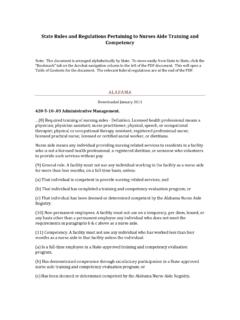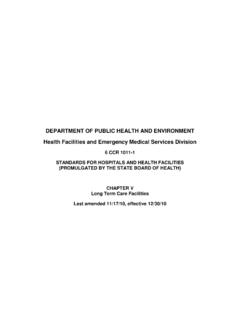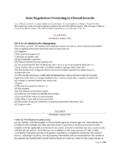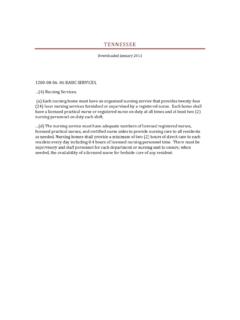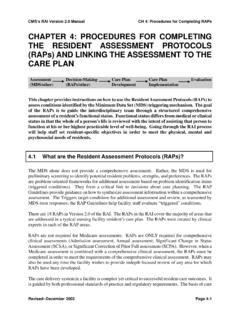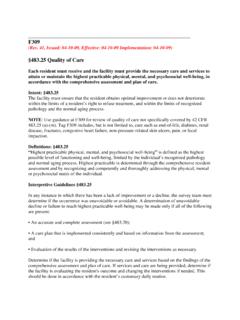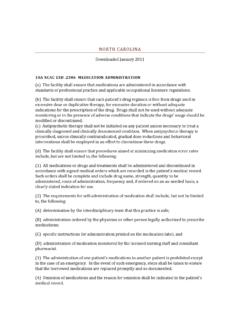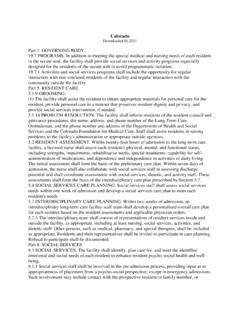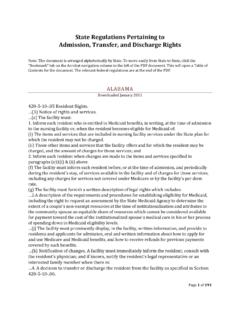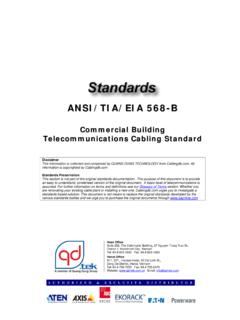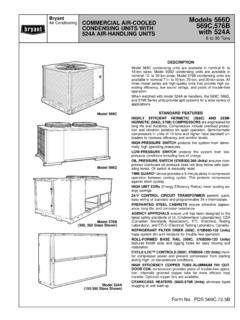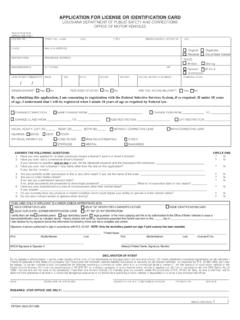Transcription of State Regulations Pertaining to Dietary Sanitation ...
1 State Regulations Pertaining to Dietary Sanitation & Environmental Conditions Note: This document is arranged alphabetically by State . To move easily from State to State , click the Bookmark tab on the Acrobat navigation column to the left of the PDF document. This will open a Table of Contents for the document. The relevant federal Regulations are at the end of the PDF. ALABAMA. Downloaded January 2011. Dietary Services. (i) Sanitary conditions. The facility must: (1) Procure food from sources approved or considered satisfactory by Federal, State , or local authorities: (2) Store, prepare, distribute, and serve food under sanitary conditions; and (3) Dispose of garbage and refuse properly.
2 ALASKA. Downloaded January 2011. 7 AAC Dietetic service (h) The facility must maintain lavatories for hand washing, with hot and cold running water, soap, and disposable towels, conveniently located in the service area used by persons who handle food. (n) Routine cleaning schedules must be posted and records of cleaning must be maintained on file for three months. ARIZONA. Downloaded January 2011. Arizona Regulations do not contain specific content for Dietary Sanitation and Environmental Conditions. Page 1 of 74. ARKANSAS. Downloaded January 2011. 562 Hygiene of Staff All food service employees shall wear appropriate, light-colored clothing including hairnet and shall keep themselves and their clothing clean.
3 All persons working as food handlers in nursing homes shall have in their possession or on file in the home in which they are employed, a current, approved health card. Persons having symptoms of communicable or infectious diseases or lesions shall not be allowed to work in the dietetic services. Food service employees shall not be assigned duties outside dietetic services. 563 Minimum Daily Food Requirements Facilities are permitted to serve commodity foods provided that the facility is registered as a non- profit organization and the foods were legally obtained directly from USDA sources. Commodity foods obtained from an individual may not be used.
4 Commodity foods shall be utilized pursuant to USDA Regulations . Facilities utilizing commodity foods shall maintain documentation, or be able to provide evidence, that the foods were obtained through proper channels. Failure to meet this requirement may result in a deficiency finding and a report to federal authorities. 565 Meal Service The public, personnel, or patients shall not be permitted to eat or drink in the kitchen, dishwashing area, or store room. Only dietetic services and administrative personnel shall be allowed in the kitchen Only dietetic services personnel shall be allowed to portion out food for patients or personnel.
5 Nursing home residents will not be permitted to work in the dietetic services. If a patient is to be allowed to scrape trays, there must be a physician's order. 568 Preparation and Storage of Food All toxic compounds shall be used with extreme caution and shall be stored in an area separate from food preparation, storage and services areas. 569 Sanitary Conditions Food shall be procured from sources approved or considered satisfactory by Federal, State and Local authorities. Floors shall be cleaned after each meal. Dishes, silverware, and glasses shall be free of breaks, tarnish, stain, cracks and chips.
6 There shall be an ample supply to serve all patients. Patients will be furnished knives, forks, and spoons unless there is documentation to indicate the patient is incapable of using these implements. Page 2 of 74. Vessels used in preparing, serving or storing food shall be made of seamless metal or a nonabsorbent material which can be easily cleaned and shall be used for no other purpose. Enamelware shall not be used. Rags from patient bedding or clothing or bath shall not be used in dietetic services for any purpose. Dishes, knives, forks, spoons, and other utensils used in the preparation and serving of foods must be stored in such a manner as to be protected from rodents, flies or other insects, dust, dirt, or other contamination.
7 Silverware shall be stored in a clean container that can be thoroughly washed and sanitized. Paper or loose covering shall not be used on shelves, cabinets, cabinet drawers, refrigerators, or stoves. Storage cabinets shall be kept clean. Cardboard boxes shall not be saved and used for the storage of food or articles which were not packed in the original box. Dishes, trays, silverware, glasses and food preparation dishes shall be cleaned, washed, and sanitized by only the following methods: Manual Dishwashing Facilities may wash and sanitize such items in a three-compartment sink. Items shall be first thoroughly cleaned and washed in warm water, one hundred to one-hundred-twenty (100 to 120).
8 Degrees Fahrenheit, containing an adequate amount of an effective soap or detergent to remove grease and solids. The wash water shall be changed often enough to keep it reasonably clean. Next, they shall be rinsed in clean water which is heated to a temperature of at least one-hundred-and- forty (140) degrees Fahrenheit. Next, they shall be completely submerged for at least two (2). minutes in clean hot water at a temperature of at least one-hundred-and-eighty (180) degrees Fahrenheit. A visible and reliable thermometer shall be conveniently available for testing the water temperature. Pots and pans which are used for preparing food which will be cooked need not be sanitized.
9 All other utensils used in the preparing or serving of food shall be sanitized prior to use. Dishes, trays, and glasses shall be allowed to air dry before storage; drying cloths shall not be used. Mechanical Dishwashing Machine Facilities may wash and sanitize such items in a mechanical spray type dishwashing machine as approved by the OLTC. All kitchen garbage, cans, trash and other waste materials shall be stored in water-tight containers provided with close-fitting lids. The kitchen garbage container shall be emptied and thoroughly washed after each meal and treated with a disinfectant if necessary.
10 All equipment and utensils shall be so constructed as to be cleaned easily and shall be kept clean at all times. All mops, brushes, dustpans, and other housecleaning equipment shall be stored in a janitor's closet when not in use. Meat and other foods shall not be placed in direct contact with ice. Page 3 of 74. Only ice of assured bacterial safety shall be permitted for use in drinks, or for the cooling of drinks by direct contact. A scoop shall be used for handling ice. Ice used to chill bottled drinks or salads, or in any food preparation, shall not be used for drinking purposes. Portable ice chests which can be sanitized shall be cleaned daily, and the ice machine shall be cleaned at least weekly.
